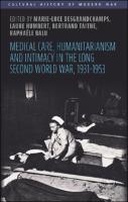Explore

Medical care, humanitarianism and intimacy in the long Second World War, 1931-1953
0 Ungluers have
Faved this Work
Login to Fave
This book offers a micro-global history of humanitarianism and medical care during the ‘long’ Second World War, challenging the traditional Eurocentric chronological boundaries of 1939/1945. It takes as its starting point the Japanese invasion of Manchuria in 1931, which led to the progressive dislocation of the League of Nations, with Japanese, German and Soviet departures in the 1930s. It ends with the termination of the Korean War in 1953 and the subsequent dismantling of the first United Coalition and UN peace enforcement operation. This periodisation allows the contributors to consider the role of extra-European spaces and conflicts, such as the Italo-Ethiopian War, conflict between Peru and Ecuador, and the Second Sino-Japanese War. Using innovative methodological approaches, including a focus on medical care and intimacy (Chapters 1 and 4), this book is neither structured around breaks and ruptures, nor linear shifts from ‘imperial humanitarianism’ to ‘neo-humanitarianism’ or ‘amateurism’ to ‘professionalism’. Instead of creating a metanarrative and an overarching story of humanitarianism during the long Second World War, it considers the slow, messy and ambivalent transformation of humanitarian actors’ relations to the suffering of distant others through studying humanitarian encounters, practices, spaces and affects. Paying close attention to actors such as French colonial doctors (Chapter 2), Swiss ICRC delegates (Chapters 3 and 10), Egyptian relief workers (Chapter 4), Chinese-style physicians (Chapter 5), Peruvian and Ecuadorian nurses (Chapter 6) and American members of the Unitarian Service Committee (Chapter 7), this book does not erase the important differences between them but provides a more holistic story of humanitarianism: one that recognises its complexity and the intensification of circulations from one conflict and front to another.
This book is included in DOAB.
Why read this book? Have your say.
You must be logged in to comment.
Rights Information
Are you the author or publisher of this work? If so, you can claim it as yours by registering as an Unglue.it rights holder.Downloads
This work has been downloaded 21 times via unglue.it ebook links.
- 21 - pdf (CC BY-NC-ND) at OAPEN Library.
Keywords
- affect
- Africa
- aid networks
- Care
- Cold War
- colonial medicine
- gender
- global history
- Humanitarianism
- Imperialism
- intimacy
- Korean War
- long second world war
- medical aid
- medicine
- Race
- red cross
- Second World War
- Sino-Japanese War
- South America
- thema EDItEUR::3 Time period qualifiers::3M c 1500 onwards to present day::3MP 20th century, c 1900 to c 1999::3MPB Early 20th century c 1900 to c 1950
- thema EDItEUR::J Society and Social Sciences::JP Politics and government::JPS International relations::JPSD Diplomacy
- thema EDItEUR::L Law::LB International law::LBB Public international law::LBBS Public international law: humanitarian law
- thema EDItEUR::M Medicine and Nursing::MB Medicine: general issues::MBX History of medicine
- thema EDItEUR::N History and Archaeology::NH History::NHB General and world history
- thema EDItEUR::N History and Archaeology::NH History::NHW Military history::NHWR Specific wars and campaigns::NHWR7 Second World War
- Veterans
Links
DOI: 10.7765/9781526183484Editions

